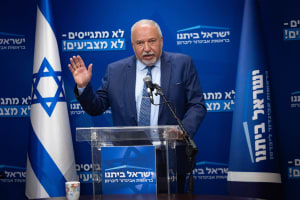Foreign medical students will no longer be accepted to study in Israel
Per government directive, Israel’s medical programs must only accept Israelis in future application windows

Countering an annual cap of 900 Israelis to the state’s medical schools each year, foreign students will no longer be able to study medicine at Israeli universities, the government decided on Tuesday.
Large numbers of Israeli medical students have had to travel to Europe in order to become medical doctors, The Jerusalem Post reported.
The Jewish state’s decision to increase the number of Israeli medical students from 900 to 1,200 students per year, and to restrict foreign students, comes in the face of the nation’s shortage of medical doctors.
While the OECD international average is 3.4 doctors per 1,000 people, in Israel the average is 3.1. In the periphery of the country, such as the Negev or the Galilee, the average is just 2.7 doctors per 1,000.
The Israeli universities that will no longer be hosting foreign medical students include Tel Aviv University Sackler Faculty of Medicine, the Ben-Gurion Faculty of Health Sciences in Beersheva and The Ruth and Bruce Rappaport Faculty of Medicine at the Technion-Israel Institute of Technology in Haifa.
Tel Aviv University’s executive dean, Dr. Stephen Lazar, criticized the decision as political.
“It is with the deepest regret that I must inform you that the Israeli government has directed all foreign medical programs, including American medical programs, to stop accepting new students,” Lazar wrote in a letter sent to the university’s foreign medical students. “This political decision was made in order to increase the availability of seats in Israeli medical schools for the Hebrew programs, so that many Israeli students will not have to travel abroad for their medical education.”
He also criticized the decision for not taking into account the multiple benefits of having an international medical student body at Israeli universities.
“Our graduates have been ambassadors for Israel, and they showcase the excellence of medical education at Israeli institutions,” Lazar wrote. “Demonstrated successful cooperation of medical institutions in the U.S., Canada and Israel were not considered in this political action.”
Since 1977, some 2,300 foreign medical students have graduated from Tel Aviv University. Both Ben-Gurion University and the Technion have offered international medical programs for around 30 years and 20 years, respectively.
Several Israeli medical professors agreed with the government’s decision, expressing their belief that the Israeli government had no other choice.
“There was no choice. We need more Israelis to study medicine here,” said Ben-Gurion University president, Prof. Daniel Chamovitz. “BGU will close the New York office, where foreigners applied for admission in Beersheva.”
“Our American supporters will surely be disappointed by the decision, and the medical school will maintain its English instruction to help immigrants and returning Israelis who prefer studying in that language. But those who worked in our international school will teach Israelis instead of foreigners. Nothing will change,” Chamovitz said.
The BGU president added that, in the past, Ben-Gurion University had asked the Council for Higher Education to permit the acceptance of Israeli students into the university’s international program for foreign students, but the CHE turned them down twice.
Former BGU president Rivka Carmi, like Chamovitz, said that the decision to exclude foreign students is “very regrettable, but there was no choice. There is a shortage of physicians and a lack of hospitals and professors available for clinical teaching.”
“The Assuta Ashdod University Hospital – the only new medical center to be built in 40 years – is a community hospital with only 300 beds. The lack of hospitals for clinical teaching is the bottleneck. A second hospital, in addition to Soroka University Medical Center, is planned for Beersheva; but that will be built in a decade, if we’re lucky.”
“I was very enthusiastic about these programs for foreign students when I was BGU’s medical dean and president, but in recent years, I saw the problems of training enough Israeli physicians and realized that there is no choice,” Carmi said. “It was the right decision not to accept foreign medical students in the future. I think there is no choice but to be in favor if you think of the needs of Israel. I say this with a heavy heart.”

The All Israel News Staff is a team of journalists in Israel.













